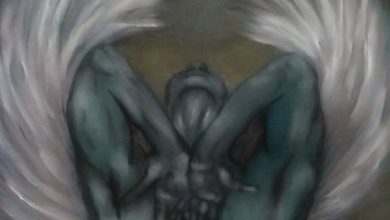
The New Tribe by Buchi Emecheta is a short story written in third-person narrative, centering around a family of four. The Arlington Couple- Ginny and Arthur, who is a vicar- and their two adopted children, Julia and Chester. Between the four of them, it is Arthur’s and Chester’s inner thoughts that are the most prevalent. Though the story is in third-person, it is as if the first half is told through Arthur’s eyes and the second through Chester’s. This is because of the insight we get to their feelings about certain things directly, whereas in the case of Ginny or Julia, the readers often understand their reactions through the observation of Chester or Arthur. The New Tribe is filled with imagery, symbolism, descriptive narration, and dialogue. The dynamic mix of characters makes it well-rounded and realistic. Further, the story spans several years, starting with the couple before they officially adopt Julia, and ending when Chester is old enough to grow as an individual. This gives the readers the feeling of growing with the family and the characters. The main themes are change, adoption (especially cross-cultural), mixed families, love, acceptance, insecurity, the feeling of not belonging, and identity. It is important to note that Emecheta was born in Nigeria, but later moved to London. Hence, she may be drawing from moments of her own experience, in terms of a Nigerian person living in a predominantly white city.
The New Tribe | Summary
The story begins on a dull morning in the house of a married couple- Ginny and Arthur Arlington. The doorbell rings, and when Ginny opens it she sees Julian, the local paper boy. He has a frantic look on his face and is holding a baby– he tells her he found the baby near the phone booths and didn’t know what to do, so he brought it to them. Arthur is stupefied as Ginny wraps the baby in her robes and exclaims that it’s a girl. As she warms some milk and dips her finger into it, letting the baby suck on it, he is amazed by his wife’s natural motherly instinct. She has always wanted a child, but it is only now that he can see how important it is to her.
They notify all the authorities possible- hospitals, the police, social services. The baby is a few hours old and of perfect health. They are unable to locate the mother, and on seeing how good Ginny is with children, she is allowed to look after the baby. They name her Julia, after the paper boy who found her. And following long and tedious paperwork, the Arlingtons become Julia’s official parents. The new parents are overjoyed, especially Ginny. They almost forget that Julia isn’t their natural child- that is, until two years later when they get a call from the Social Service, asking if they can have a meeting on Wednesday. They are understandably worried- they think that Julia might be taken away.
Fortunately, that is the complete opposite of the case. In fact, the Arlingtons are asked whether they would like to foster another child- an eighteen-month-old boy. The boy’s name is Chester, and his mother had followed the Arlington’s progress with Julia in the press, deciding they would be perfect parents. She is pregnant with twins, and her husband is not ready to accept Chester, as he is another man’s child. Hence, despite her love for her son, she must give him up. The story stirs the empathy in Ginny, and she agrees immediately to take him in. The social service workers add that Chester is black- his mother is from Nigeria. The information creates an air of frozen shock in the room, which thaws over when the Arlingtons confirm that they would absolutely have Chester.
Arthur is a little wary about the legal adoption process- he remembers how tedious it is. He tries to look for Catherine, a final chance for her to come out- after all, he knows she could return to claim him at any time- but she is nowhere to be found. Ginny calmly says that even if she does show up later, they will cross that bridge when they get to it, and Arthur is once more struck by his wife’s poise in the face of chaos. Whatever the case may be, though, both Arthur and Ginny love Chester dearly.
Ginny doesn’t know much about Nigeria- she has an image in her mind, but when she researches about the country in the library, she realises how culturally rich it is. She wants Chester to be able to read books about African-Americans, but there are none in the library, so she makes one for him herself. After some time, the Arlingtons became the official parents of Chester. Arthur picks up the post with the declaration and warns Ginny that this is the last time- he cannot do it all again. She agrees, dancing around the room in joy. Finally, with their little family, Ginny is content. She puts her everything into motherhood and flourishes.
Growing up, Chester cannot pinpoint the moment he feels like he may be adopted. But from a young age he harbours an inexplicable feeling of not belonging. He knows his parents are the Arlingtons, who sheltered him and Julia greatly. On his first day of school, he missed his mother’s presence and cried, prompting the teacher to call Julia to calm him down. The headmaster jokes harmlessly about it, and Julia promptly defends Chester, saying “He’s my brother!” This draws a quiet exchange of glances between the headmistress and the teacher, something Chester can sense but not fully understand. Days later, a boy named Ray Miller starts school. He cries, as well, and Chester comforts him, which starts their close friendship.
In school, the students are to put on a play. Chester is given the role of a king from the Orient, and he doesn’t quite understand why, but he is proud of the attention. He is praised for his role and people tell him he looks like an African King, a true King of the Orient. He asks his mother on the way home where the Orient is, and his parents explain that it is in the east, where Africa is. And Africa is where “his people” come from. Chester has always considered the Arlingtons ‘his people’ and now the feeling of not belonging grows a little.
Years later, as Chester and Julia grow up, so does Chester’s curiosity. One day, as they are preparing for a beach trip, Chester asks Arthur who his real parents are. The question arises because of comments made by children at school, and recounting the incident makes Julia burst into tears. Chester reassures her that she must be their parents’ child, for she is white. But it is only after this that Arthur and Ginny gently explain the truth to them. They reiterate several times the true and pure love they have for the two, and the tense atmosphere is dissolved when Julia gets up and says “Can we go to the beach now?”
However, there are little changes in the house after the truth of the adoption is revealed. Chester begins to have dreams of a faraway village- an African village which he starts thinking of as “his place”. He does not tell anybody, not even Julia. Julia has been far more introverted since she learnt the truth, staring blankly into space and not speaking at all. These changes worry Ginny- she is not used to such an environment. She begins to lose a little of her calm composure, and in turn, Arthur becomes gentler with them. That’s why it is a surprise one day when he loses his temper over something small, scolding both the children harshly. The tense atmosphere affects all of them in different ways.
Ever since realising he was adopted, Chester assumes he will have to leave home someday, like the men in his father’s parish who travel abroad and return with great tales. His parents have made it clear that his adoption was not an act of charity, but an act of love, and he knows it as well. But it makes him feel the need to behave well- he is adopted, the son of a Reverend, and the only black boy in the city. He must behave well. Arthur notices many details, far more than he lets on. This is why he is not surprised during Christmastime, which is the season of the annual school play. Chester announces that he does not want to play his usual role of the first king, and runs off to his friend Ray Miller’s house.
Ginny is shocked- she spent a long time making a costume for him, and he has always played that role for years. Arthur points out that he is growing and things do not remain the same forever, making Ginny a little upset. To calm her down, Julia suggests the two of them head to the Millers’ house to call Chester home for dinner. It is only then that they realise why he no longer wants to play the King- the other kids at school had called Chester “the king of devils” behind his back. He became aware of it when his best friend, Ray, heard of it and informed him. Ginny is shaken on hearing this, as she hates negativity of any sort. Chester, however, feels far more comfortable with his role backstage, just one of the crowd.
Nonetheless, it upsets him that his mother is saddened by the change of events- he never wants to upset his mother. To make up for it, he buys her a pretty diary for Christmas and apologizes, saying he just didn’t want to be the king anymore. And his mother accepts it, responding that she just wasn’t aware of how strongly he felt about it. She adores the gift, which makes Chester very happy. To Chester, this incident marks the end of his childhood and the beginning of his growth as an independent individual. He is still the vicar’s, Arthur’s son, but he has his own identity, too. Most importantly, he did not hurt his mother too much, for he hates to hurt her. And he knows his father cannot be hurt, as he is like the Rock of Gibraltar.
The New Tribe | Analysis
The story begins with an unsuspectingly normal description of a dull morning and an ordinary couple. However, that changes immediately when the paperboy, Julian, turns up with a baby he found at the telephone booth. The quick change between the couple’s daily morning routine and the baby’s entry- especially for something so life-changing- adds to the suddenness of the situation. The speed at which the mood shifts induces a feeling of anticipation in the readers, and also implies the stupefied disbelief of Ginny and Arthur Arlington as they cope with the change and care for the baby all at once.
It only takes a few paragraphs to understand the Arlington couple’s nature. They are naturally very affectionate and selfless people, as seen in the way they took in the baby without a question. Ginny’s natural reaction shows her motherly instinct and caring nature, while Arthur’s reminder to fulfill the due legal procedures- such as calling police, social services, etc.- highlights his logical and steady nature. Even when he becomes slightly harried and confused, Ginny maintains a calm serenity. They balance each other out, adjusting their temperament and actions to best compliment the other. This is important to keep in mind, because it shows in the way they raise Julie and Chester, as well. Both children are well attuned to the emotions of others, and often attempt to act appropriately for the mood of the room. This can be seen when Chester notices the exchange of glances between his teacher and the headmistress, and when he gifts his mother the diary, as well as the way Julia reacts after hearing the truth about their adoption- by simply standing up and saying that they should hurry to the beach.
The abruptness of Chester’s arrival to the family is reminiscent of that of Julia’s. Granted, the legal adoption process itself is very slow and tedious, and drains Arthur’s energy. But they were called to social services very suddenly, and only then found out that someone had been keeping tabs of their progress with Julia. The readers once again experience the fast-paced change in situation and mood, re-building the anticipation. When the family finds out that Chester is black, they are surprised. Their shock may stem from the fact that Chester’s Nigerian mother sought out a white family to adopt her son. This story was released in 2000, and cross-cultural adoption was not very common. But Ginny and Arthur accept him with the same, unfaltering love and care- the colour of his skin does not matter to them. To the Arlington’s, Chester is their son. Julia clearly feels the same way, as she maintains a protective instinct towards Chester throughout the story.
There is a brief acknowledgement of unintentional ignorance, when it is said that Ginny imagined the entire Nigeria to be a poor, dreadful, violent country. One often forms images of places based on what they hear from others or see in the media. This is perhaps the case with Ginny, as well- her ignorance is not purposeful, but it is ignorance nonetheless. She immediately rectifies herself by recognizing her mistake and gaining the necessary knowledge. She even goes as far as to make African-themed books for Chester so that he can see characters that look like him, as the library had none. This underlines the passion and love Ginny has as a mother, and the importance she gives to Chester knowing his roots and feeling belonged. The fact that the library had not a single African book is a blatant display of a lack of inclusivity– Ginny does not want Chester to grow up feeling excluded, or like an outsider. She wants him to be able to read books with African characters just as much as white ones- a nod to the importance she shows to equality and respect for her son’s background.
Emecheta brings in themes of insecurity and the feeling of not belonging as Chester grows older. This is a gradual way to address the awareness that comes with age. As a child, everything seems new and exciting. However, as one grows, they start to notice things about themselves and their surroundings. Noticing things about appearance is especially prevalent because it is the most outwardly obvious. The more Chester starts to realise that there is something different in the way he looks as compared to his family, he starts to feel distant. Readers may wonder why he is letting appearance get to him, but it is crucial to remember that he is only a young boy. He is curious about things he sees, and when he notices he is the only one who looks different in his family, it is natural to feel a sense of insecurity about it. We see here, as mentioned earlier, an example of Chester’s emotional awareness– he does not bring up his feelings because he does not want to upset his parents.
When Julia says staunchly, “He’s my brother” on Chester’s first day of school, it is the first instance of an outside glance into the family. All these years, despite the lingering sense of detachment, Chester had felt secure under the loving roof of Ginny and Arthur. It is probably clear to Julia, too, that their skin colours are different, but that does not seem to cause any doubts. Because to her, it doesn’t matter- whatever they look like, they are siblings. Their love for one another goes beyond such aspects and focuses solely on the bond alone. This is the difference between how the Arlingtons see themselves and how the headmaster and the teacher see them. In the first week of school, Chester also makes a friend named Ray Miller. This friend remains constant throughout the story, even as Chester grows. Hence, Ray might symbolise a sense of steadiness and comfort for Chester. Even when his mindset changes, his personality develops, his family dynamics change, his friendship with Ray is sure.
When Chester finally asks about his real parents, we see a huge difference between him and Julia. Chester has always known that he was not the Arlingtons’ biological child. This is proven when he tells Julia that she is theirs’s because she is white (not knowing that she was adopted, too). From this line, we can see that his conclusion did come from the difference in their skin colour. Meanwhile, he assumes that Julia is not adopted because her skin colour matches their parent’s. This may be why, in the long run, Julia takes the news a little harder. At the moment, she responds nonchalantly, but Chester notices that she becomes more introverted, staring into space and not speaking much. Chester has had years to process the reality and his feelings about it before asking the question to know the details. But for Julia, it was a shock- she never expected that she, too, was adopted.
Chester’s recurring dreams about an African village highlight the theme of identity. This is the beginning of his internal battle with understanding himself- he knows he is an Arlington, son of Arthur and Ginny and brother of Julia. But he begins to refer to the place in the dream as “his place”. Similar to how, when he asks Ginny where the Orient is, she says it’s in the East where “his people” live. Small reminders like this, reiterating the fact that Chester is not originally from this town, and is of a different culture, create a divide within him. It is not that he wants to denounce one aspect of his identity in favour of another- he wants to understand the different parts of himself.
The slight change in the family dynamic after the revelation is almost expected. Here, we once again see the alterations of temperament so that they can match each other. Chester does not tell Julia about his dreams because she already seems bothered. Ginny begins to lose some of her trademark serenity, so Arthur becomes gentler. Even when he explodes for seemingly no reason, it is clear to the readers that he is upset about the tension between them, as well. Chester several times mentions his father to be unshakeable, calm and composed like a steady rock. His burst of anger with the excuse of the children’s laughter may be to hide the vulnerability of his feelings.
When Chester decides he no longer wants to play the African King in the play, a role he had reprised for years, Ginny is shocked and upset. Meanwhile, Arthur had been expecting it. Ginny’s feelings symbolise the difficulty of letting go. Here, she realises she has to let go of Chester’s youth and innocence. He understands more now, he is aware of his truth and the differences the society sees in him, being the only black child of the town. He is aware of people’s words and comments, and he knows that he is ‘different’. Rather than just not belonging, he feels the pressure of being himself. The only back child in the neighbourhood, the son of the Vicar, an adopted son. We also see how he thinks that being adopted means he needs to move out soon- he feels like a burden onto the family, and feels bad for thinking that way because he is completely aware of their love for him. Ginny is upset not only by the negativity he must encounter, but by the fact that he’s old enough to realise it.
Chester’s decision not to play the king anymore shows two things- his ability to make his own decisions, and his wish to be seen as ‘one of the crowd.’ Making a choice and standing by it is his first step in the journey to moulding his identity. It is a mark of individuality, to have an opinion and a reason for it, and then explain it to others. This brings in the theme of growth and change. There has been a lot of change within the Arlington family as a unit, and now it is time for Chester’s independent growth. He knows himself as Ginny and Harry’s son, but he also wants to find his identity as just Chester Arlington. He also mentions that he enjoyed working in the invisibility of the backstage. This signifies his wish to feel belonged. His appearance and culture is different from everybody else’s in the town, including his own family. No matter how long he has lived there, there will always be another side to his identity. Working backstage, rather than in the spotlight, does not set him apart from the crowd. The focus would not be on him, and that made him feel at ease and included.
In the end, we see once again Chester’s emotional awareness. He hates to upset his mother, so he apologizes to her and explains his decision. She, too, understands him better after their conversation. He also gives her a diary, which she loves. The diary is fresh– there is nothing written on it yet. It symbolises new beginnings. Chester is ready for them to enter a new chapter of their lives as a family, and that experience is yet to be written. The diary represents a new start. The story concludes with the theme of acceptance. Chester is ready to continue his journey to independence and individuality with a new sense of serenity, much like Ginny’s. He knows his circumstances, and marks this the end of his childhood. Chester accepts himself, as well as his family- Ginny, Arthur and Julia.



